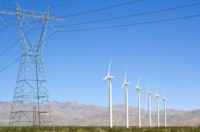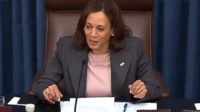In the multifaceted climate-change strategy released in an executive order one week into office, President Joe Biden made clear that climate is central to job creation, infrastructure investment and housing development.
“A key plank of our Build Back Better Recovery Plan is building a modern, resilient climate infrastructure and clean-energy future that will create millions of good-paying union jobs,” the president said, with a goal to create 10 million new jobs.
Former Michigan Gov. Jennifer Granholm, in her Energy Secretary confirmation hearing before the Senate Energy and Natural Resources Committee, also on Jan. 27, further stressed the Biden clean-energy strategy as a major jobs creator—hoping to ease concerns of several Republican members over additional fossil-fuel-sector impacts in their states following the Keystone pipeline shutdown.
Granholm was approved by the committee 13-4 on Feb. 3, with nay votes from Wyoming, Louisiana, Utah and Mississippi Republicans. Observers expect her to win full Senate confirmation, set for later this month.
Also now set for full Senate vote as Commerce Secretary is Rhode Island Gov. Gina Raimondo, who cleared Commerce Committee review with a 21-3 approval on Feb. 3. At her hearing, she said infrastructure resilience would be a priority, as would renewable energy. The nation's first offshore wind farm was built in 2017 off the state's coast. She also enacted new state clean energy goals, to have all power from renewable sources by 2030.
A state report released last month indicated that the goal is achievable, according to The Providence Journal.
Among COVID-19 economic recovery initiatives Biden highlighted were hiring more than 250,000 workers to cap abandoned U.S. oil-and-gas wells, developing 1.5-million energy-efficient housing units, including public housing, and installing 500,000 electric vehicle-charging units across the country.
Biden also emphasized his goal to have, by 2035, a “100% carbon-pollution-free electric sector,” as well as a multipronged approach to clean-energy innovation and infrastructure in generation, storage and transmission that draws on expertise of scientists, engineers, construction craft workers, as well as experts from land-grant universities and historically Black colleges and universities .
The executive order includes provisions to use public land for renewable-energy production, alongside a goal to double the current level of offshore wind energy capacity by 2030.
A spokeswoman for giant European turbine maker Siemens Gamesa said that the firm, "which has 4.3 GW of conditional supply agreements in the U.S. ... is actively engaged in discussions with stakeholders in several states on how we can localize our supply chain to the benefit of local communities."
She added that the firm "anticipates that larger investment decisions on manufacturing strategy for the U.S. will happen as part of delivering the current order backlog."
Among other directives in the Biden order are a 60-day moratorium on oil-and-gas leases for development on public land for a review, and a call for federal agency heads to submit within four months their plans for climate adaptation, resilience and efficiency at all government facilities, and ensure that all federal permitting decisions "consider the effects" of greenhouse-gas emissions and climate change.
“Seeing the White House prioritize action around greening the federal footprint and federal infrastructure investments as part of the ‘whole of government’ approach to climate is consistent with our policy priorities to reduce carbon footprints and boost resilience across the building sector,” said Elizabeth Beardsley. U.S. Green Building Council senior policy counsel in a statement.
U.S. Sen. Shelley Moore Capito (R-W.Va.), a member of the Senate Environment and Public Works Committee, criticized the plan as an example of government overreach that “leaves rural communities and union workers in the dust; just ask those who were working on the Keystone XL pipeline.”
Biden addressed approaches to “revitalize the economies of coal, oil-and-gas, and power plant communities,” including “turning old brownfield sites into new hubs of economic growth.”
Former Michigan Gov. Jennifer Granholm, in her Energy Secretary confirmation hearing before the Senate Energy and Natural Resources Committee, also on Jan. 27, further stressed the Biden clean-energy strategy as a major jobs creator—hoping to ease concerns of several Republican members over additional fossil-fuel-sector impacts in their states following the Keystone pipeline shutdown.
“Coal and natural gas are not going away. Don’t leave them stranded in the ground," stressed Wyoming Sen. John Barrasso, now the top committee Republican. “America needs a broad energy mix.” Other Republicans were concerned how quickly new job opportunities would materialize.
“I am obsessed with creating good paying jobs in America," Granholm told the confirmation panel. “In making energy in America, we will make sure no worker gets left behind.”
The committee now says it will vote on her nomination on Feb. 3 at 10am.
Emphasizing her role in diversifying the Michigan economy in the wake of auto-industry plant closures during the 2008-09 recession that she said created a 25% statewide unemployment rate, she noted the state's push into battery production and other renewable-energy sectors and emphasized the role that DOE and its national labs could play in research and funding.
Granholm said she was “1,000%” in support of prioritizing clean-energy job growth in areas of the U.S. with major fossil-fuel-sector exposure. In response to questions, she said President Biden has assembled a government “swat team” that will focus on “communities that have powered America.” But she stressed that with fossil-fuel projects, "we have to develop technologies that reduce greenhouse-gas emissions.”
The former governor also called for boosting U.S. production of clean-energy equipment and materials such as lithium for battery storage. "We should be energy secure in the cleanest way possible," she said.
In response to Senators’ concerns about a large Obama administration investment in a solar developer that went bankrupt, Granholm urged them not to ”look at failures as a reason not to invest.” She said that for every dollar Michigan invested in clean-energy technology, "we got back $2.30."
Granholm noted that a "high priority" for DOE will be a joint effort with the Federal Energy Regulatory Commission to modify and expand the U..S power transmission network to boost clean-energy connections and said she would consider a request by Montana Republican Steve Daines to site a carbon-capture and storage facility in that state.
Despite DOE’s major funded mission in nuclear-waste cleanup and management of America’s nuclear weapons legacy sites, questioning of Granholm focused primarily on impacts of the energy transition now under way. But she did note administration opposition to nuclear-waste storage at the Yucca Mountain repository in Nevada.






